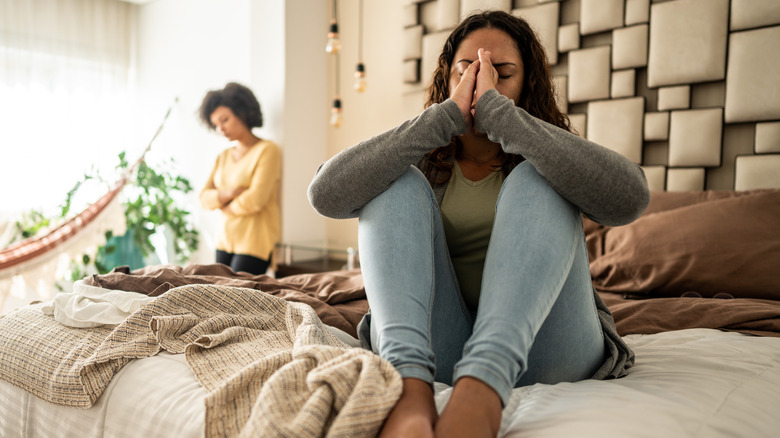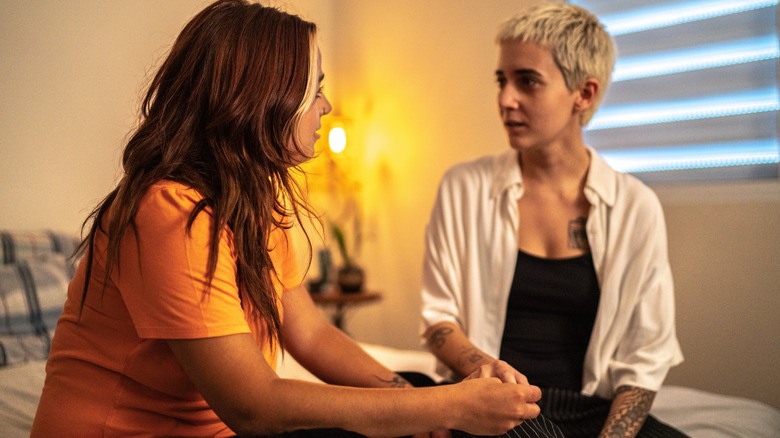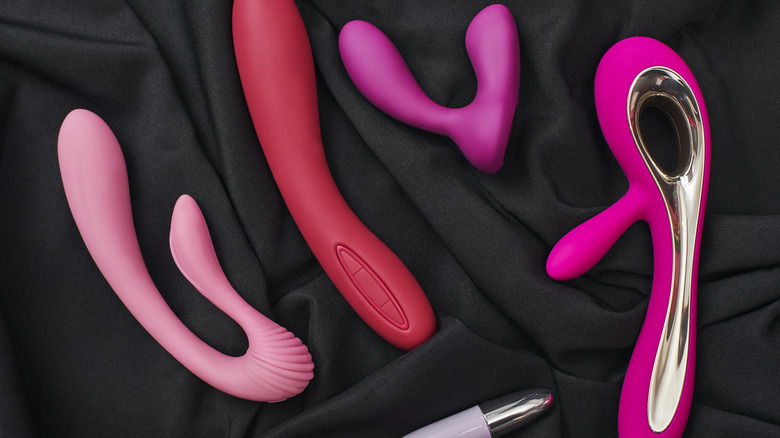Sexologist Tells Us How To Handle Having A Lower Sex Drive Than Your Partner
Although no healthy partnership should be all about sex, it's an important part of the equation. Sex plays a big role in physical and mental health by releasing oxytocin, but it also creates intimacy, keeping the bond between the two people in the relationship going strong. As significant as sex is to a relationship, it can become an issue if one partner has a lower sex drive than the other. If this sounds like you, don't worry: it's super common.
According to a 2015 study published in the Personality and Social Psychology Bulletin, a whopping 80% of participants had experienced a desire discrepancy — the scientific term for this dilemma — in their relationship, and 95% confirmed that it had happened within the last year. "What I see clinically with couples struggling is, 'I thought our sex life was so amazing. I thought this is what it would [always] be,'" sex and relationships researcher Kristen Mark, Ph.D., MPH told InStyle. "I think it's important to not let it become this elephant in the room ... To work together to come up with solutions."
While it's important to come up with ways to resolve, or at least manage desire discrepancy, it's certainly not an easy thing to do. Because this can be such a sensitive issue for couples and requires a bit of unpacking, Women exclusively spoke to Dr. Jennifer Litner, sexologist and founder of Embrace Sexual Wellness, on how to handle being the one in the relationship with the lower sex drive.
Understand that there's nothing wrong with you
No matter where your sex drive normally resides — high, low, somewhere in the middle — you've probably noticed that it fluctuates. In fact, one's desire for sex and intimacy can change every day. "There are so many factors that influence a person's desire for sex — our mood, environment, stress levels, trauma symptoms, body image, emotional connectedness, and general relationship satisfaction can all be contributing factors," Dr. Litner exclusively tells Women. "Mismatched desire may occur when partners have different sensitivities to these factors that influence their sexual interest."
A perfect example of this is if one partner is experiencing grief and one isn't. Grief naturally decreases sexual interest and if your "partner is not in the same emotional state and frequently interested in sex, this could lead to mismatched desire," says Litner. But that's just one of possibly thousands of reasons why you're experiencing a low sex drive; anything can decrease it and keep it lowered for an indefinite amount of time. Once you realize that this is simply a part of being human and there's nothing wrong with you, then you can navigate the topic with your partner in a healthy way that's more about meeting your needs at the moment, as opposed to how your partner might be reacting to your low libido.
Talk to your partner about how you feel
Of course, communicating with your partner is a very important part of managing your lower libido but what's equally essential is being able to explain why it is this way that's respectful to both you and your partner. "I don't think we can ever control how another person feels or thinks," says Litner. "However, sharing the context behind one's experience of low libido can help their partner understand."
Where things can get tricky is if you've already parsed through all the possible factors of your low libido and have surmised your partner might be the problem. If this is the case, it's important to proceed with sensitivity and empathy. "Over-personalizing a partner's decreased interest in sex can lead to more strife than necessary," Litner exclusively tells Women. "Sometimes a person's decreased interest is related to how their partner is engaging with them, but sometimes it's something totally unrelated."
No matter what the reason might be, it's going to require openness, understanding, and even creativity on both your parts to come to terms with it and take steps to deal with it. "Teaming up with them to address the thing(s) that get in the way may be a helpful strategy," says Litner.
Schedule sexy times that don't have to be about sex
While the thought of scheduling sex might seem anything but sexy, it's actually quite beneficial because it gives you the chance to prepare and get your head in the game. "I will forever shout this from the rooftop: Being intentional is the new sexy," relationship coach Beverley Andre, LMFT told Glamour. "Some people get it wrong when they think of scheduling sex ... If you want to ensure that you and your partner prioritize connection, fun, and sexual chemistry, schedule it."
Litner suggests setting aside time regularly to not only put connection front and center, as Andre said, but to "focus on centering pleasure." According to Litner, that doesn't need to be sex. Pleasure can come from a great meal that you make together, a trip to the museum to check out some beautiful works of art, or an inspiring conversation. There are so many places where pleasure can be found if you open your mind to the possibilities.
Find other ways to experience intimacy
Although intimacy is often tossed into the same category as romance and sex, it's important to realize that that's just not how intimacy works. There are many different types of intimacy and each one brings a uniqueness to the relationship. "Intimacy is a culture of closeness and connection between two (or more) people that builds over time," psychologist and sex therapist Megan Fleming, PhD told Women's Health. "Physical intimacy is not inherently sexual, [while] emotional intimacy is what's created when individuals are vulnerable with one another about their feelings, dreams, and private thoughts."
According to Litner, openly discussing sex and sexuality is one type of intimacy, as is continuing "to engage in non-sexual physical affection." When you and your partner can subtract the sex from intimacy — just as you should when thinking about pleasure — it gives you so much to work with and experience together. And, if those experiences are new, even better. As a 2000 study published in the Journal of Personality and Social Psychology found — and this is just one of many on the subject — couples who engage in novel and exciting things have higher relationship satisfaction.
Redefine what sex means to you and your partner
According to a 2020 study published in the Archives of Sexual Behavior, couples with desire discrepancies tend to try many different strategies to handle the discrepancy, and one of those ways is by taking intercourse out of the equation. For some of the study's participants, using sex toys and/or being physically close without touching, like mutual masturbation, could turn on their responsive desire. In the case that responsive desire wasn't encouraged, it still gives the partner with the higher sex drive an activity that they could sexually enjoy.
If you find that you've exhausted everything in your quest to handle your low sex drive and you think it's time to see a doctor, then do that, but don't feel like it's something you have to do or is required of you. Your libido is going to come and go in waves (big and small) throughout your lifetime. Just because it's lower than your partner's now, doesn't mean that it will necessarily always be that way.





